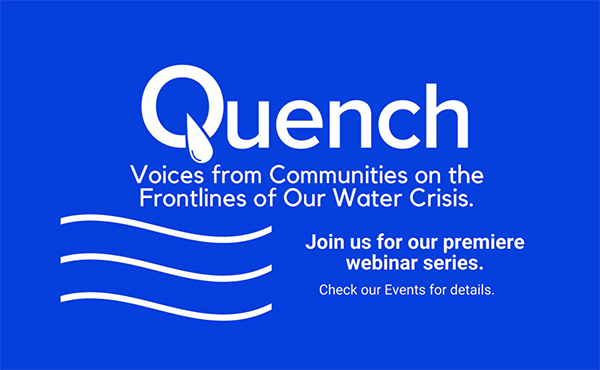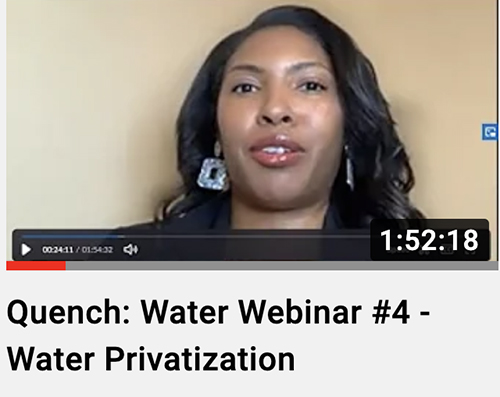Editor’s note: Corporate water has been taking away the public’s control of water for decades. A webinar on water privatization with community speakers from different parts of the country, streamed live on June 24, 2021. It is the fourth in the “Quench” water series. It explores what water privatization means, how it affects communities, legislation to watch out for, and what people are doing to fight back. Sponsors include the People’s Tribune/Tribuno del Pueblo, Food and Water Watch, Our Illinois Revolution; People’s Water Board; Denmark Citizens for Safe Water; Youth for Global Health & Social Justice & Walk Around the World for Water. Democracy Defense League, and others from across the country. The “Quench” webinars aim to connect with and support all communities in this fight, and to help build a powerful movement for water as life.

Below are excerpts from the presentations:
Mary Grant, Public Water for All Campaign Director, Food and Water Watch:
“The White House has approved a bipartisan infrastructure framework to provide privatization of public assets, [known as P3’s.] Nine out of ten [people in the U.S.,] get their water from a publicly owned utility. The states with the highest percentage (30%) of privatization are Delaware, West Virginia, Kentucky, Idaho, New Jersey, Pennsylvania and Connecticut. Veolia-Suez, American Water, and Aqua America are the largest corporations targeting cash-strapped cities. The essential danger with privatization is loss of local control. Corporations are first and foremost accountable to their owners and shareholders, not the public.”
David McMahon, Norristown, PA:
“We chased Aqua out. I knew about the national and international drive to privatize water, so a few of us built a group to stop it. We took advantage of the provision within our Home Rule Charter to potentially repeal ordinances, and petitioned our city council. It took three petition drives. We built out a strong coalition, got double the signatures, and Aqua PA withdrew its offer. We then stood up to help neighboring towns to stop the sale: the commodification of water as the overall problem. Our next step is to move from a defensive position, building the awareness of what is coming, and what the impact of this privatization is going to be.”
View the webinar by clicking below.
Dallas Fowler, Californians for Clean Water Reliability:
“We were victorious in California last year in stopping Senate Bill 625 which was fast tracked as a bill related to COVID [which meant no public hearings] and it would send the Central Basin water district into receivership affecting two million people. It was a smash and grab, a hostile takeover. If we let this happen the rest of California would be next. For three months, we did the outreach educating the community, making sure they understood that it was essentially going to privatize our water, and what that meant: from a lien on your home to simply not being able to afford water. We cannot allow our water utility systems to be for profit here. That would be devastating, especially among the other housing and homeless crises we are battling. It would also lead to mass gentrification. We were able to see just how far private water would go to enact this hostile takeover.”
Martha Camacho Rodriguez, Air, Water Soil organizer for SEELA (Social Eco Education LA):
“I want to start with recognition that we are on indigenous land. I want to say that you are my ‘other me.’’ It’s a moral Mayan code meaning what I do unto you. I do unto myself. Everybody learning about water should know that legal does not equal safe. Many of us don’t know there’s contaminants in our water unless you smell, see, or taste something or it doesn’t look like what you normally drink. Moving from the [very contaminated] Central Valley to Los Angeles in 2003, to me was positive in that I thought it would be a little bit of an ease from contaminants in air, water, and soil. My first encounter with water that was contaminated was in the teachers’ lounge [where I teach.] We assumed yellow water was coming from a backed-up sewer. It was Manganese. I want to remind everybody when we reference our communities of color we talk about them not being healthy; they have a high absentee rate; or many teachers complain their students are making excuses that they have stomach aches, thinking it’s a ploy to not stay in school; and we don’t remember or don’t know that in our communities many of our students and their families are exposed to multiple contaminants. Manganese is very dangerous.”
Leticia Vasquez Wilson, Elected Board Member of Central Basin Municipal Water District:
“We’ve been fighting this anti-corporatization, privatization fight in California for the past year and a half. There’s been some very aggressive efforts on the side of the corporate water interests to buy up or if they’re able to get it through their elected friends to take over public water systems. When I was a City Council Member, I came across information that these private water corporations are overseen by the Public Utilities Commission and the members of the Commission are appointed by the governor or members of the legislature. Many come from the private sector so they’re very friendly to the corporate water interests. So, we organized people, and raised money to testify to the utilities commission in San Francisco against the massive rate increases. I was asked to run for the Water Board which encompasses 24 cities, including unincorporated areas in LA County, and was elected in 2012. The board [which] basically is there to serve the interests of corporate water in our region, filed a lawsuit against me to silence me [from talking about] the issue of water quality, contamination, and privatization.”
Watch the video: Quench: Water Webinar #4 on Water Privatization at https://www.youtube.com/channel/UCEDaKHz3C-eBOteG-OQiTUg



Who owns the water in California? Does everyone have the right to clean drinking water? This must be protected.